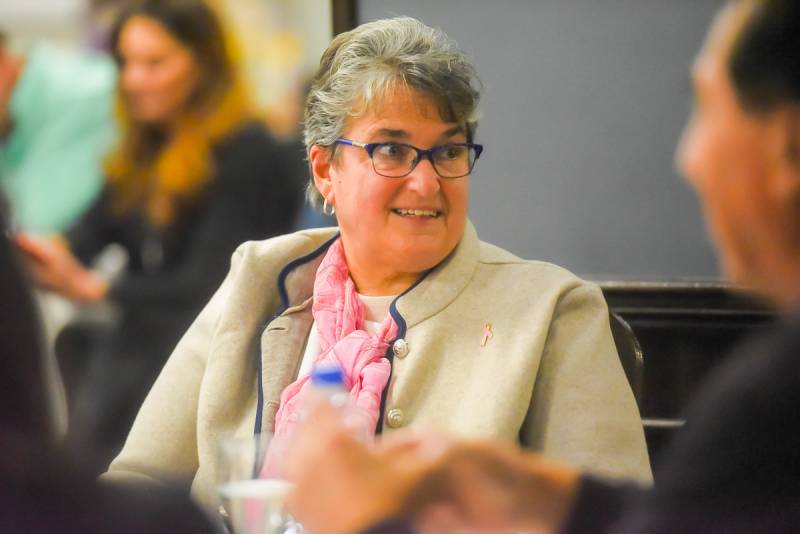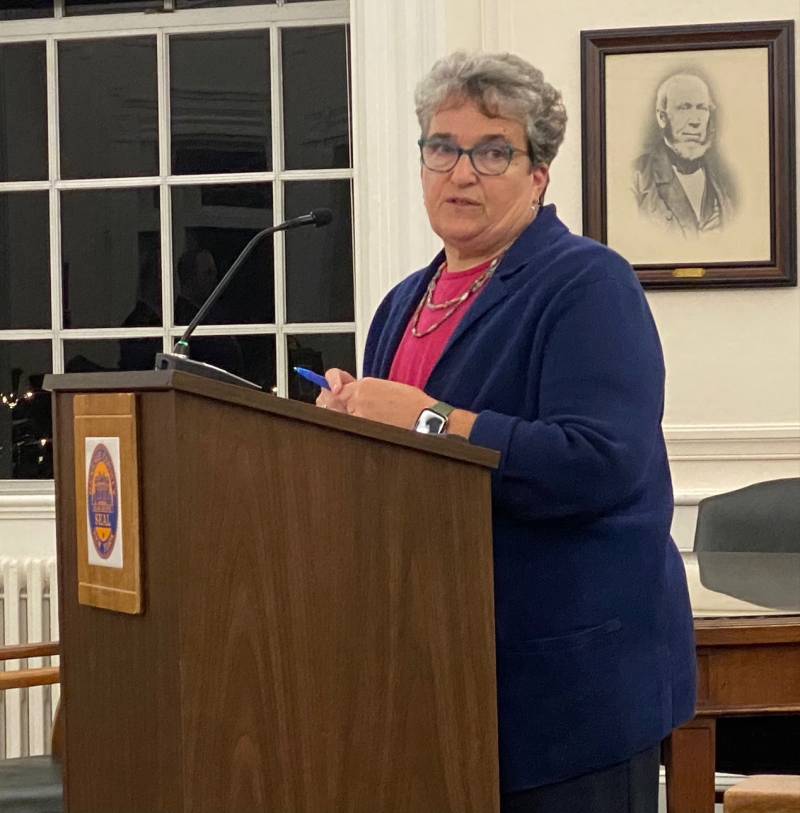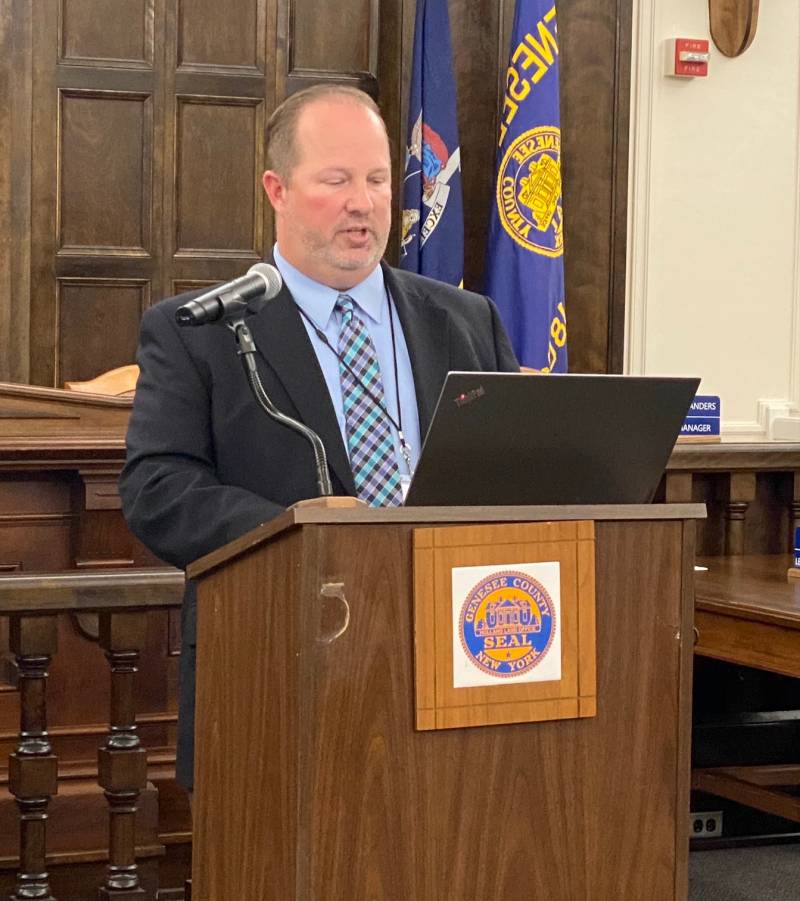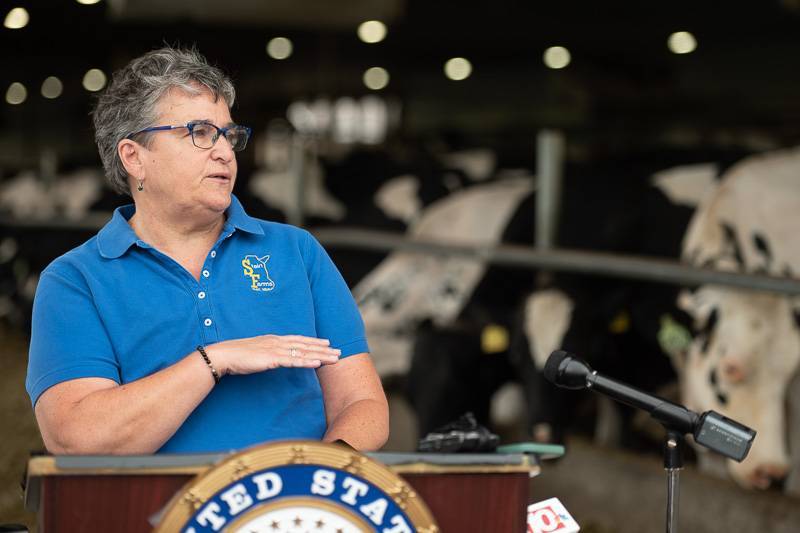Candidate Stein says experience has 'brought me to a place where I am tested, proven, trustworthy'
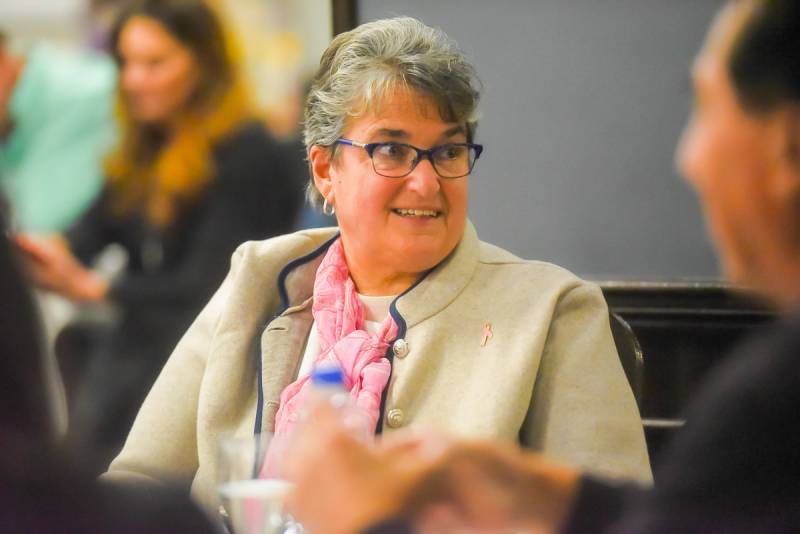
File photo by Howard Owens.
Rochelle “Shelley” Stein’s opponent for the District 5 Genesee County legislator seat has said there is a disconnect between Stein and her Le Roy constituents, and The Batavian asked if she knew why or how she would address it.
The way Stein sees it, there was a tie at the Le Roy Republican Committee, resulting in a non-endorsement, and another non-endorsement at the county level, which means a Primary, she said. She is running against newcomer Laurie Mancuso for the District 5 seat on the Genesee County Legislature.
“And this is the democratic process, and I welcome the opportunity to confirm for folks that I'm doing the work that I was elected to do as the county legislator from Le Roy,” she said. “Some of the things that I can absolutely point to are the direct county investments in Le Roy, and that being a multi-year subsidy contract with Le Roy Ambulance so that we can lessen response time and maintain a robust EMS system here in Le Roy that also can respond in the county. We purchased equipment for Le Roy Ambulance for $185,000, and that puts life-saving equipment on those ambulances.
“We also have invested in the high-speed broadband available to all address points, and those investments improve the quality of life in Le Roy,” she said. “And just today, I know that Spectrum has been calling on folks on Thwing Road and North Road, and Griswold Road is on its way. These direct investments are incredibly important to people here in Le Roy.”
Stein said that she is a positive force working for Le Roy, and however other candidates want to campaign, “I am going to stick by what I have done, what I've brought forward of my work and my responsibilities at the county,” she said.
One bone of contention appears to be the sales tax agreement, which was discussed beginning in 2018 and approved on August 25, 2021. The deal capped sales tax distribution at $10 million for the city of Batavia, towns and villages within the county. Ever since, there have apparently been concerns and complaints by town board officials — a few of whom have spoken during county budget talks — and it was shared with Stein as “the crux” of issues with her reelection, she said.
“I’m very proud of the fact that this Legislature takes a long view on capital investments that have to be made, such as the jail and the change to the sales tax agreement that was done. The jail belongs to everybody here in the community, and this is what the county needed to do. It was a difficult decision to come to. It was difficult for legislators. It was difficult for our communities,” she said. “The county Legislature took the stance that when we could share extra, we would, as far as additional revenue distribution, and we actually did that twice. So we did what we said we were going to do.”
The deal was a way to pay off the state-mandated and unfunded $70 million new county jail, Stein said. By capping sales tax distribution, the county was able to reserve $4 million a year for the jail’s debt service.
“I don’t know how that was misconstrued, let me put it that way,” she said. “I’m the only candidate who has any sort of county experience or municipal experience, and I will continue to represent Le Roy in a positive manner.”
The sales tax agreement is for 40 years to match the jail’s debt service, she said. And it didn’t just happen.
“Conversations were had for three years ahead of this. There was a lot of conversation and explanation from the county, including the county manager and the county treasurer. However, this jail did not have any funding stream available from the state. There are no grants,” she said. “It is a requirement by the state of New York to replace this 100-plus-year-old jail, which, quite frankly, other legislatures had kicked down the road. We didn’t have any options left. So you stand up and you do the difficult tasks at hand, and you take the criticisms at the same time.”
As for Stein being elected as the county Legislature’s chairwoman, a two-year term she has consecutively served since 2020, she believes that has only bolstered her position both as a legislator and representative of Le Roy.
Although her opponent has openly questioned whether it’s a distraction from her District 5 duties, Stein said she thinks “a strength the community would want to have in their elected leader is that other legislators have tapped me to be chair … that shows that there is a trust and a value that other legislators put in me.”
She also shared how her position as chair connects her to opportunities that she in turn communicates to her district officials.
“Just this week … I have shared with both our mayor and supervisor, village clerk and town clerk about the Rochester Area Community Foundation. They are targeting grants for rural communities this year, and I have been in touch with (a key official), asking that I can host a conversation in the county, I would prefer that it would be in Le Roy, of course, or somewhere close to Le Roy, where we can have them come in and talk to us specifically about how these grants are going to work, what the application deadline is, understand the mission of the Rochester Area Foundation, why they are targeting rural towns and villages in Genesee and Orleans County, And what the grant would look like on the front end and the reporting process on the back end.
“Gov. Hochul just announced $100 million available for municipal and not-for-profit community centers. So I again sent this off to both the town clerk, village clerk, the village mayor and the town supervisor because I know that there is an interest in revamping the community pool,” she said. “Then this same week, the consolidated funding application workshop was noted and, again, sent that off, and the GCEDC hosted a meeting for a workshop … so these communications I continue to share these opportunities with both the town and village because when I get these opportunities, sharing them is the best way to keep communication going, and the opportunity for our communities to apply to these grants.”
She added that for the past two years, the county has budgeted for each town and village to obtain up to $5,000 for grant-writing services — a way to bring back our taxpayers’ dollars in the state government to work in their communities, she said, and “all very positive.”
If you were reelected, what do you feel are the needs of Le Roy, and what would be your priorities?
Completion of the 2050 Comprehensive Plan
“That is really going to help us determine how we address challenges in our 10 focus areas,” she said, including the latest one of community wellness to address a lack of beds for end-of-life care; how to get communication out to seniors and sufficiently connect them to services and common tools they can use when not familiar with email and websites.
Obtain the total funding for the $150 million Phase 3 water capacity project
“The impetus of that focus for myself was the fact that we lost out in Le Roy on the Great Lakes Cheese plant, which would have brought hundreds of jobs to our community, and would have been able to help grow our community,” she said. “And that was in 2022 when we lost that opportunity for that economic development project, that really kick-started the focus on getting Phase 3 water capacity, and I have been diligent, committed, laser focused.
"I have been the one who has the networks with our state and federal funding entities, our engineering folks, our water engineering folks," she said. "Tim Hens said it best: ‘this was the first time that they felt support from the Legislature to really buckle down and knuckle in on this water capacity.’ So that all started from a project that Le Roy lost.”
Initiate a land bank
To help renovate dilapidated homes, get them out of bank holdings and bring them back onto the tax rolls, put those homes back into homeowners’ hands.
The role of the Legislature chair is elected by the other legislators. Stein said that she would serve again if asked to do so by the other members, adding that “there is a lot of work that is unseen.”
For example, she is or has been involved in the Genesee Regional Transportation Council, which funds some bridge projects; the Genesee Regional Finger Lakes Planning Council that works on the comprehensive plan for the village of Le Roy; and three different committees that cover environment, agriculture and resources, and intergovernmental issues.
She is on the National Association of Counties board, Ag Committee, the Rural Action Caucus, a liaison for Workforce Investment Board, Office For the Aging Advisory Board, Inter-county of Western New York, Genesee 2050 Comprehensive Plan, and GLOW Works Inc.
On a more personal note, Stein also volunteers and serves at Our Lady of Mercy as an Eucharistic Minister and Lector, has been a trustee of the Le Roy parish for 12 years, and has taught catechism doctrine classes for seven years. She was a 30-year volunteer at the Oatka Festival and was part of the Bergen and Le Roy America’s Best Communities grant program, which earned those municipalities a $25,000 economic development plan.
Her 70-year family farm has grown and raised a second generation of ownership, she said, with now its third generation “being interested, being active in agriculture, growing a farm and continuing on with farming,” Stein said. The current owners are her two children, Jerrod and Natasha, and her nephew, Nathaniel, while Stein remains involved as an employee. There have been some accusations of the relationship between her official position and Stein Farms having received grant money in the past.
“I don’t have ownership in the farm. Any grant awarded to the farm is competitive,” she said. “There is no connection to the county; nobody has that amount of reach.”
She stated that her voting record can be verified, and the only potential conflict of interest she recalled was related to a conservation easement. She left the meeting while the remaining legislators discussed the matter and took any related votes. The Batavian did not have time to review her prior voting records before publication.
Why do you believe you deserve the vote for District 5 legislator?
“Because I am steadfast here in Le Roy. I have experience in local government,” Stein said. “I learned what it was like as a town supervisor for eight years and now in the Legislature, that foundation of municipal experience has brought me to a place where I am knowledgeable, I am tested, proven, and I'm trustworthy. That's why I deserve people's votes.”
Early voting for this year's Primary begins at 9 a.m. Saturday at the Arc Community Center, 38 Woodrow Road, Batavia.

